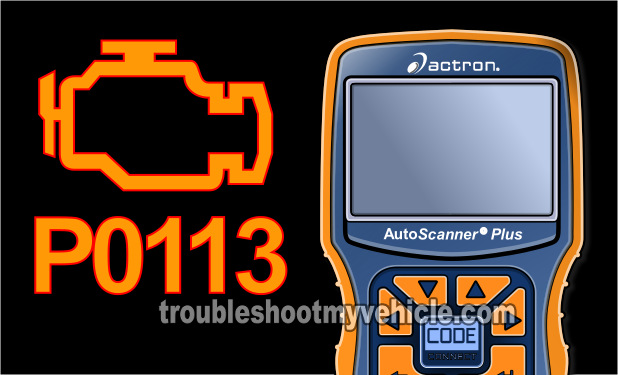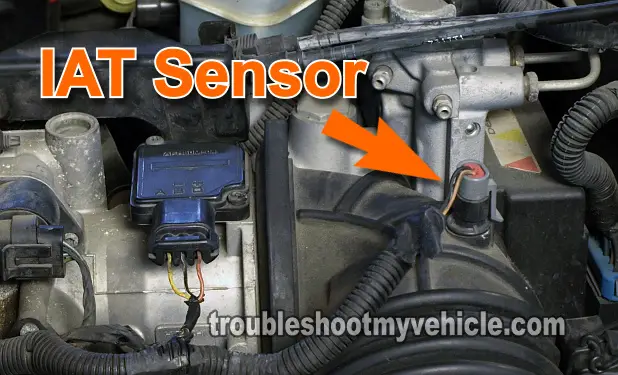
OBD II trouble code P0113 Intake Air Temperature Circuit High Input usually points to a bad intake air temperature (IAT) sensor, but now always.
In this tutorial, I'm gonna' show you some of the basics you need to know about what DTC P0113 means and a step-by-step test on how to test it.
Contents of this tutorial:
- P0113 Basics You Need To Know.
- Symptoms Of A P0113 Diagnostic Trouble Code.
- Where To Buy The Intake Air Temp Sensor And Save.
- Common Causes Of A P0113 Trouble Code.
- Troubleshooting P0113: Intake Air Temperature Circuit High Input.
- TEST 1: Checking The Intake Air Temperature Value.
- TEST 2: Wiggle Testing the IAT Sensor's Wiring.
- TEST 3: Jumpering the IAT Sensor Circuit.
- More 3.8L V6 GM Tutorials.
P0113 Basics You Need To Know

One of the most important things we need to know is that code P0113 is referring to a malfunction in the temperature value that the intake air temperature sensor (IAT) is reporting to the PCM. Specifically, that the IAT sensor is reporting a high voltage.
When the PCM see this high voltage, which is usually 5 Volts DC, it thinks that the temperature is around -38 °F (-39 °C). Yeah, Minus 38 degrees Fahrenheit.
As you may already be aware, the IAT sensor's job is to sense and report the temperature of the air entering the engine. Why does the fuel injection computer need to know this temperature? This is because the warmer the air, the less fuel the PCM (Powertrain Control Module = Fuel Injection Computer) needs to inject into the cylinders.
To better understand the intake air temperature (IAT) sensor's job, here's a brief explanation of how it works:
- The intake air temperature (IAT) sensor has two wires in its connector.
- One wire supplies 5 Volts from the PCM.
- The other wire is a Ground wire. The PCM supplies this Ground internally.
- The IAT sensor is a resistor (technically a thermistor). Its resistance changes in response to changes in the air's temperature.
- The cooler the air, the higher the resistance of the IAT sensor.
- The warmer the air, the lower the resistance of the IAT sensor.
- When the 5 Volts pass through the intake air temperature (IAT) sensor, the resistance of the sensor produces a voltage drop. This in plain English means that only a certain amount of the 5 Volts are let through to the Ground wire (the amount of voltage that doesn't make it thru', due to the sensor's resistance, is considered the ‘voltage drop’).
- The cooler the air is, the less Voltage is let thru' onto the Ground wire (due to the IAT sensor's higher resistance).
- The PCM translates this higher voltage drop into a colder temperature value.
- The warmer the air, the more Voltage is let thru' onto the Ground wire (due to the IAT sensor's lower resistance).
- The PCM translates this lower voltage drop into a warmer/hotter temperature value.
- The cooler the air is, the less Voltage is let thru' onto the Ground wire (due to the IAT sensor's higher resistance).
So, when a P0113 Intake Air Temperature Circuit High Input is registered, the PCM is letting you know that the intake air temperature (IAT) sensor is reporting an extremely high voltage drop (think disconnected sensor).
In other words, the 5 Volts it's sending to the IAT sensor cannot pass thru' it. The PCM reacts to this by interpreting this into an extremely cold temperature.
Symptoms Of A P0113 Diagnostic Trouble Code
When the intake air temperature (IAT) sensor fails, and starts to report an extremely low temperature (-38 °F), the air/fuel mixture that the PCM is trying to control is gonna' suffer.
The symptoms of a bad intake air temperature (IAT) sensor are:
- Check engine light (CEL) is on.
- DTC P0113 is present.
- Won't pass the state mandated emissions test.
- Gas mileage will suffer.
- Rough idle.
- Hard start and/or extended cranking time.
- Black smoke coming out of the tailpipe.
Let's take a look at the next subheading and find out the common causes of a P0113 DTC.
Where To Buy The Intake Air Temp Sensor And Save
Since your Buick (Chevrolet, Oldsmobile, Pontiac) is a GM vehicle, there's a good chance that you can buy the original AC Delco (Delphi) intake air temperature (IAT) sensor online for a whole lot cheaper than somewhere local.
The following links will help you comparison shop for the AC/Delco (Delphi) and aftermarket IAT sensor:
Disclosure: As an Amazon Associate, I earn from qualifying purchases. If my tutorials help you, using these links is an easy way to support the site at no extra cost to you. Thank you!
Common Causes Of A P0113 Trouble Code
Here are the most common causes of a P0113 diagnostic trouble code (DTC):
- Bad intake air temperature sensor.
- Intake air temperature sensor wires have an ‘open’.
- What this means is that the wires are cut at some point between the IAT sensor and the PCM.
- What usually happens is that the metal terminals, inside the IAT sensor's connector, are making a false contact with the male spade terminals of the sensor (this is quite common).
- Bad PCM (Powertrain Control Module = Fuel Injection Computer).
- This is very rare, but it does happen.
Although it stinks that your car or mini-van is lighting up the check engine light (CEL) with P0113, the cool thing is that troubleshooting and finding out if the IAT sensor is at fault is not hard at all. Let's turn the page and get testing!



